- Date2023-12-20 10:50
- View13,056
The Korea Environment Institute (KEI) hosted six special seminars to commemorate its 30th anniversary this year. The seminars focused on specific topics within each field of environmental policy, such as carbon neutrality, water management, circular economy, and environmental impact assessment (EIA). Environmental experts from academia and related government departments gathered to discuss the future of environmental policy in Korea, reflecting on KEI’s research history and identifying its new roles. Here, we briefly introduce the discussions held during each seminar.
The First Seminar (March 29): “30 Years of KEI, Reflections and Visions for the Future: Carbon Neutrality and Green Transition”
The first special seminar was hosted at the Korea Press Center in Seoul, focusing on Korea’s achievements in carbon neutrality and green transition policies over the past 30 years, as well as KEI’s visions for the future. Since 1990, KEI has laid the foundation for achieving carbon neutrality, contributing to the development of policies spanning emissions trading, climate negotiations, greenhouse gas reductions, and renewable energy. After 2010, it has taken a leading role in establishing the direction of the Korean Green New Deal and enacting laws related to carbon neutrality. Now, carbon neutrality research at KEI is geared towards practical contributions for protecting humanity from the climate crisis, emphasizing detailed and evidence-based analysis for policy application.
Meanwhile, to contribute to the realization of green transition, KEI will need to conduct more comprehensive, macroscopic research encompassing environmental conservation, economic growth, and social welfare. Experts emphasized the importance of KEI serving as a hub that connects complex governance structures and suggested that it continually introspects to propose new directions.
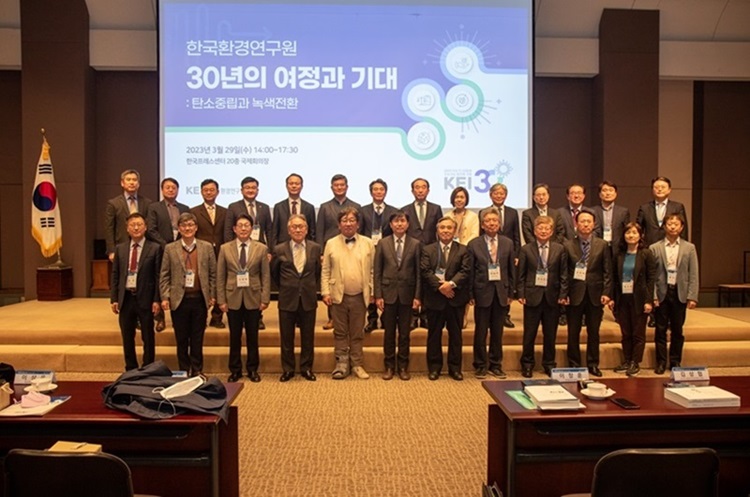
Group photo featuring the key participants of the first special seminar.
Dr. Sungwon Kang, Head of the Division for Green Transition, presenting on the 30-year history of Korea's green transition policies.
The Second Seminar (June 21): “Dialogue between Policy and Field: 30 Years of Environmental Policy Research and Environmental Movement”
The second special seminar, co-hosted by KEI and the Korea Federation for Environmental Movements at the Korea Federation of Banks, reflected on achievements in environmental policy research and environmental movement over the past 30 years, seeking future cooperation opportunities.
Over the past 30 years, environmental policy research in the Republic of Korea shifted from addressing pending issues to scientific advancement. In the 1990s, global environmental conservation efforts facilitated Korea’s participation in international agreements. The 2000s saw the earnest incorporation of sustainable development into policy and significant progress in greenhouse gas reduction research. In the 2010s, ecosystem services assessment, integrated water management, circular economy, and smart green cities became active areas of research. Now, KEI is expected to strengthen policy mixes, enhance crisis responses, further consider social aspects of environmental policy, improve evidence-based research, and propose new models.
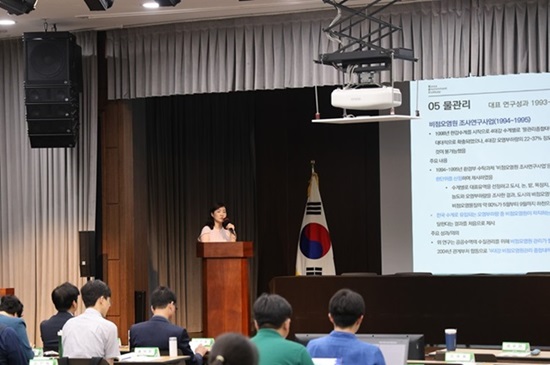
Dr. Woo Hyun Chung, Chief Research Fellow of the Division for Green Transition, presenting on the 30-year history of environmental policy research.
The Third Seminar (July 5): “The Past, Present, and Future of Water Management in the Republic of Korea”
The third special seminar, hosted at the Korea Press Center, explored achievements and outcomes in water management policy research over the past 30 years and aimed to identify the future direction of water management policy in the Republic of Korea. The country currently faces various challenges in this field, such as climate change, green algae, and aging infrastructure. Discussions included topics related to financial integrity, population decline, and the impact of the climate crisis on water management budgets. Additionally, there was an emphasis on addressing the deficit in water and sewage system operations and enhancing the monitoring of finances transferred to local governments.
In addition, water management technology and research utilizing artificial intelligence, such as green algae monitoring with drones and satellite filming and wastewater treatment simulations using deep learning were introduced. The necessity for smooth communication with clients receiving water services in the era of risk management was highlighted, and the importance of reaching consensus between supply and demand was emphasized for proper allocation of responsibilities and obligations.
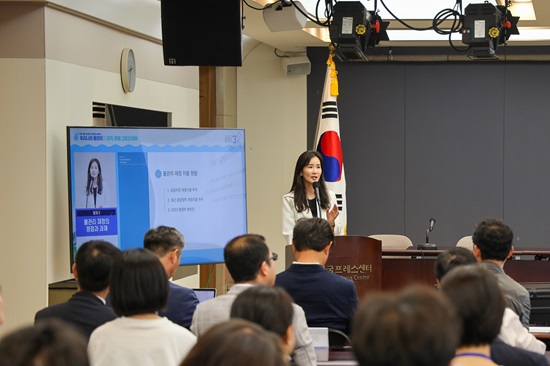
Dr. Haejin Han, Chief Research Fellow of the Division for Integrated Water Management, presenting on the critical challenges in water management finance and tasks ahead.
The Fourth Seminar (October 31): “The Era of Carbon Neutrality and Green Transition: Future Directions for Land and Nature Policy”
The fourth special seminar, hosted at the Korea Chamber of Commerce and Industry, aimed to identify the direction for land and nature policy in the Republic of Korea in the context of carbon neutrality and green transition, in collaboration with the Korea Environmental Policy and Administration Society (KEPAS).
In the natural environment field, KEI is contributing to addressing challenges and developing relevant policies by analyzing diverse current issues such as the introduction of non-native species, groundwater pollution, and mid- to long-term biodiversity conservation strategy development.
Regarding the field of land management, there is a need for a comprehensive land and nature policy database based on spatial characteristics. As part of practicing citizen science, KEI is expected to explore and devise capacity building initiatives for regions and citizens, along with developing the database and its utilization plans.
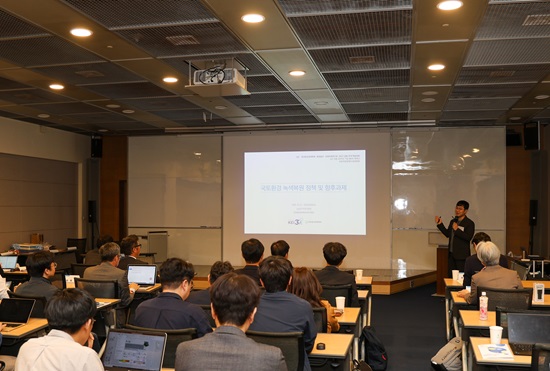
Dr. Seungwoo Son, Research Fellow of the Division for Environmental Planning, presenting on the green restoration policies and future tasks in the field of land management.
The Fifth Seminar (November 2): “Direction for Carbon Neutrality and Circular Economy Policy Considering the Industry”
The fifth special seminar, held at the Korea Chamber of Commerce and Industry, sought to evaluate the trends and accomplishments of carbon neutrality and circular economy policies in Korea, and discuss future directions in collaboration with the industry. Given that Korea’s industrial structure relies significantly on manufacturing, the insights and opinions of the industry play a crucial role in the realization of a carbon-neutral and circular economy society. During the seminar, devising specific financial support initiatives was identified as one of the major tasks, along with addressing challenges such as the transformation of the industrial structure, implementation of circular economy practices, and tackling inherent issues in energy infrastructure. The lack of policy consistency and the uncertainty surrounding investments were also emphasized. KEI plans to consistently engage with the industry, ensuring ongoing assessment and necessary improvements in policy development.
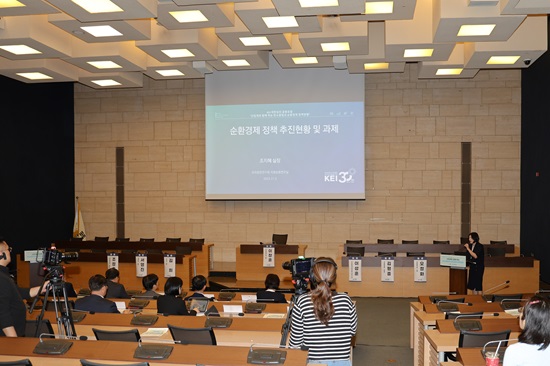
Dr. Ji Hye Jo, Chief Research Fellow of the Division for Resource Circulation, presenting on the current status of circular economy policies in South Korea and tasks ahead.
The Sixth Seminar (November 23): “The Traces and Future of Environmental Impact Assessment”
The final special seminar, held at the Koreana Hotel, specifically focused on the 26-year history of KEI’s Environmental Assessment Group, designated as the professional EIA agency after the revision of the Environment Assessment Act in 1997. Since the designation, KEI has conducted 225 in-house EIA research projects and a total of 302 commissioned projects. KEI’s flagship projects include research on rational prediction techniques for EIA, developing guidelines for deciding EIA items and range, health impact assessment techniques, post-EIA environmental management evaluation, and guidelines for locating solar and wind power generation plants.
Experts proposed strengthening professionalism, playing a leading role in preventing, minimizing, and resolving social conflicts related to environmental impact, enhancing communication with international EIA agencies, and securing independence as KEI’s future tasks for the sustainable development of EIA. Additionally, KEI is expected to contribute to increasing citizen participation and identifying the future directions of Korea’s EIA system, considering both global and domestic contexts.
Dr. Youngsoo Lee, Chief Research Fellow from the Division for Public Infrastructure Assessment, providing a comprehensive overview of the 30-year history of the Environmental Assessment Act and KEI.
- PrevList of Articles by KEI Scholars Published in the Journals Indexed in SCIE/SSCI (updated in December..
- Next2023 Green Korea & Environmental Forum
